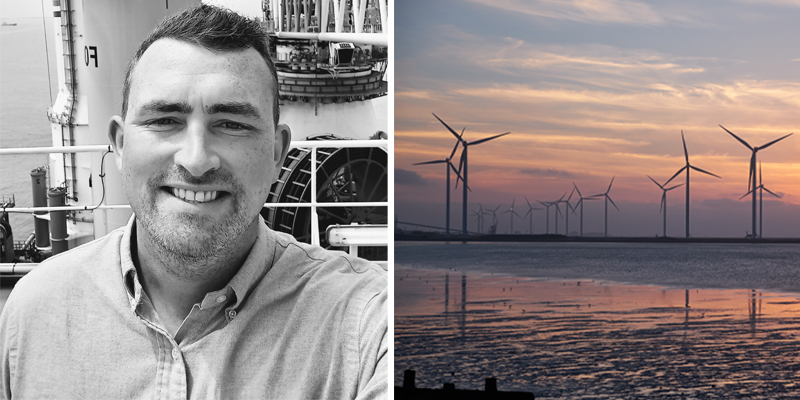
Perched on top of a large North Sea oil and gas rig that was being decommissioned, William O’Brien watched on as a large offshore windfarm capable of powering 450,000 homes with clean energy was being installed within eyeshot.
Observing from the deck of the redundant Beatrice Bravo platform, the paradox was not lost on William. With his feet planted on the wrong side of progress, upskilling and retraining weren’t so much of a choice but a necessity.
Every day I would watch clean renewable wind turbines being erected, while we were abandoning carbon intensive oil wells.
One day I had a lightbulb moment and decided to go back to college and attempt to enter the renewable industry on the business side of things.
I spent a lot of time reading through course outlines and eventually decided that UCC’s MSc Business Economics programme was the best fit for me.
Having followed his father into the oil and gas industry after graduating from CIT with a BIS degree in 2013, William had spent over five years working on a number of offshore platforms with Halliburton.
Motivated to make the transition into a commercial or business development role with the energy giant, William had investigated the possibility of completing any number of part time programmes before singling out the MSc Business Economics at Cork University Business School.
Shortly after I finished my last exam in 2013, I moved to Aberdeen and was on an oil rig 100 miles north of the Shetland Islands a couple of weeks later.
I grew up on stories about oil rigs and always wanted to get involved myself. Offshore drilling is a fast paced, high-stakes and exciting line of work that really appealed to my sense of adventure.
I spent five years working offshore in oil and gas, including a year working on the world's hottest, highest pressure reservoir.
But the industry was changing, and I wanted to make the switch into renewables so that I could change with it and become involved in the development of high value - high return projects.
Once enrolled in the programme, William’s ambition to align the development of his skillset with the future direction of the energy industry saw him develop a concept for a thesis that focused on the opportunities offered by automation.
Set against the backdrop of a sector that encounters any number of distinct challenges, William’s thought-provoking study found that elements of the industry will continue to defy the rapid adoption of automated technology in the medium term.
While some aspects of the oil and gas industry are already heavily automated, areas such as exploration and initial extraction may be resilient to automation due to the level of non-routine tasks that are encountered in the drilling process.
Even in the renewable sector, there are any number of non-routine tasks involved in offshore and nearshore drilling, as well as foundation installation.
In my opinion, the highly dynamic nature of the business will lead to lower levels of automation relative to other industries.
William’s study left such an impression on faculty at CUBS that he was offered a tutoring position after graduating, before being invited to work on an EPA funded research project within the Economics department.
However, given William’s desire to work in the renewable energy sector, he wasn’t going to think twice about taking up an offer to become part of Large Diameter Drilling’s Cork based team.
Large Diameter Drilling are a marine drilling and foundations specialist for the renewable energy industry.
I joined the Business Development Team, where I work closely with our engineering department to attract and secure projects globally.
As a Cork native and lover of all things Cork, I love the fact that I can work with a globally leading company here.
Their presence in Cork is a testament to the amount of engineering talent that exists in the city and county.
In his role as a Business Development Engineer, William has been able to combine the knowledge he developed at CUBS with the practical experience he gained working on the North Sea.
William’s ability to combine expert knowledge with specialist experience has allowed him to map his career ambitions against his sense of adventure.
A perk of this industry is that I recently had the opportunity to travel to France and join LDD’s offshore operations team onboard the DEME Innovation.
There, I assisted with the installation of the first offshore wind turbine to be installed off the coast of France, which was also the world’s first wind farm to use drilled XL-monopile foundations.
I firmly believe that the MSc Business Economics programme has been vital to my ability to perform effectively within the highly competitive renewables space.
After landing what seems to be his dream job, William’s attention is focussed on helping Large Diameter Drilling secure high-profile projects like the St Nazaire Offshore Windfarm that LDD/Core Grouting recently broke ground on.

